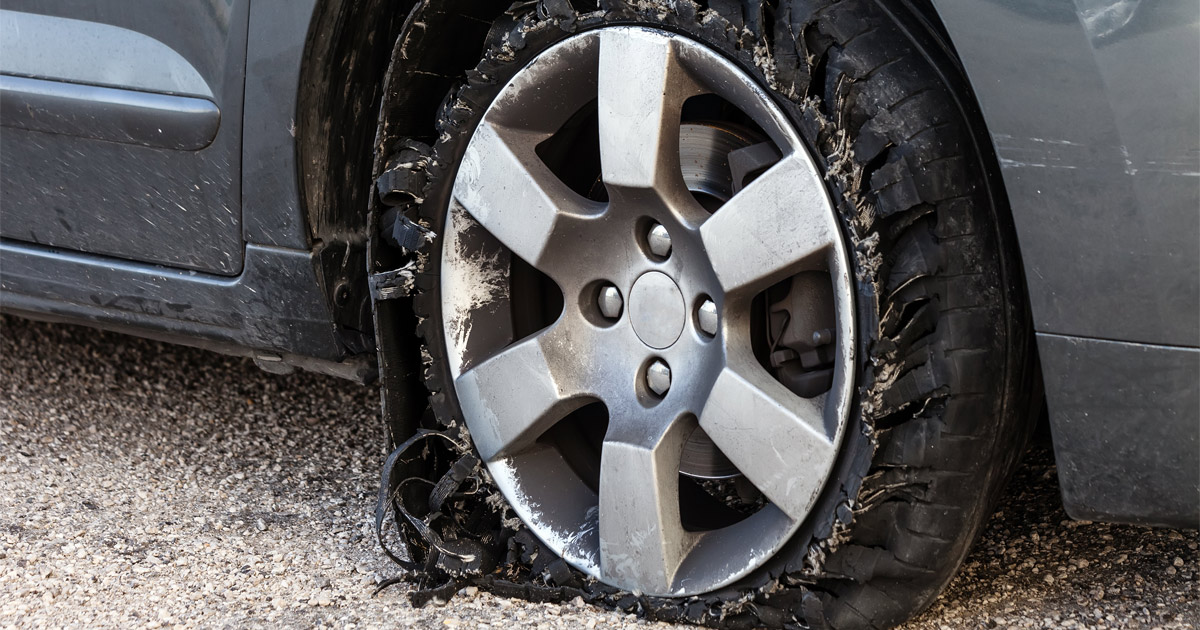To achieve optimal safety, your vehicle must be well-maintained and operating to its fullest potential. However, many drivers do not maintain their vehicles and overlook simple upkeep, such as getting the oil changed or checking and adjusting tire pressure.
Maintaining your tire pressure to the correct specification is essential. An underinflated tire can make too much contact with the road’s surface, causing an increase of friction. The tire then overheats, and the integrity of the tire breaks down prematurely, causing tread separation or a blown out tire.
What Happens When a Tire Is Underinflated?
A tire blowout can lead to a car accident. Not only does the blown tire cause the driver to lose control, but debris from the tread can cause motorists from behind the car to swerve. The likelihood of this scenario increases when the weather is hotter and the road’s temperature is raised.
Low tire pressures can cause a myriad of problems for your car, including:
- Dry rot: Underinflated tires accelerate the breakdown of the rubber, which is essentially dry rot.
- Handling issues: Without the proper tire pressure, the sidewall of a tire flexes more than usual, which causes poor handling and decreased brake performance.
- Wheel vibrations: Low tire pressures also cause wheel vibrations, both in the tire’s wheel and steering wheel, causing a loss of control for the driver.
Driving on an underinflated tire is dangerous and happens more often than you may think. In fact, the National Highway Traffic Safety Administration (NHTSA) found that almost one-third of all passenger cars, light trucks, and SUVS on the road right now have at least one underinflated tire. They also found that thousands of injuries could be prevented each year if drivers check their tire pressure more often.
When Should You Check Your Tire Pressure?
Many drivers believe that they should only check their tire pressure if the low pressure light is illuminated on the dashboard. However, you should check your tire pressure at least once a month with an accurate tire pressure gauge. Use your own gauge; do not rely on public tire pressure stations found at gas stations, as their readings are often incorrect.
Should you go on an extended drive, check your tire pressure beforehand. Keep in mind that colder temperatures lower your tire pressure by a few pounds, and hotter temperatures raise the pressure. The best time to check your tire pressures is after the car has sat for a few hours. Cold tires provide a more accurate reading than warm tires.
Do not use the tire pressure labeled on the tire itself, that is the maximum pressure the tire allows. Instead, use your vehicle’s recommended tire pressure, which is on a label inside the doorframe of the front driver side door or in the owner’s manual.
Riding on your vehicle’s correct tire pressure helps the ride feel more comfortable and also improves gas mileage. Doing so also helps prevent car accidents and injuries. However, should you get into an accident involving a tire blowout, it may be difficult to determine who is liable. In any serious tire-related accident, you should contact a car accident lawyer as soon as possible for legal help.
Delco Car Accident Lawyers at Eckell Sparks Can Help You After a Serious Tire-Related Collision
If you have been injured in a serious accident involving a blown out tire, then you should contact one of our Delco car accident lawyers at Eckell, Sparks, Levy, Auerbach, Monte, Sloane, Matthews & Auslander, P.C. for legal assistance. Call us today at 610-565-3701 or fill out our online form for an initial consultation. Located in Media and West Chester, Pennsylvania, we proudly serve clients throughout Delaware County, Chester County, and Montgomery County.

